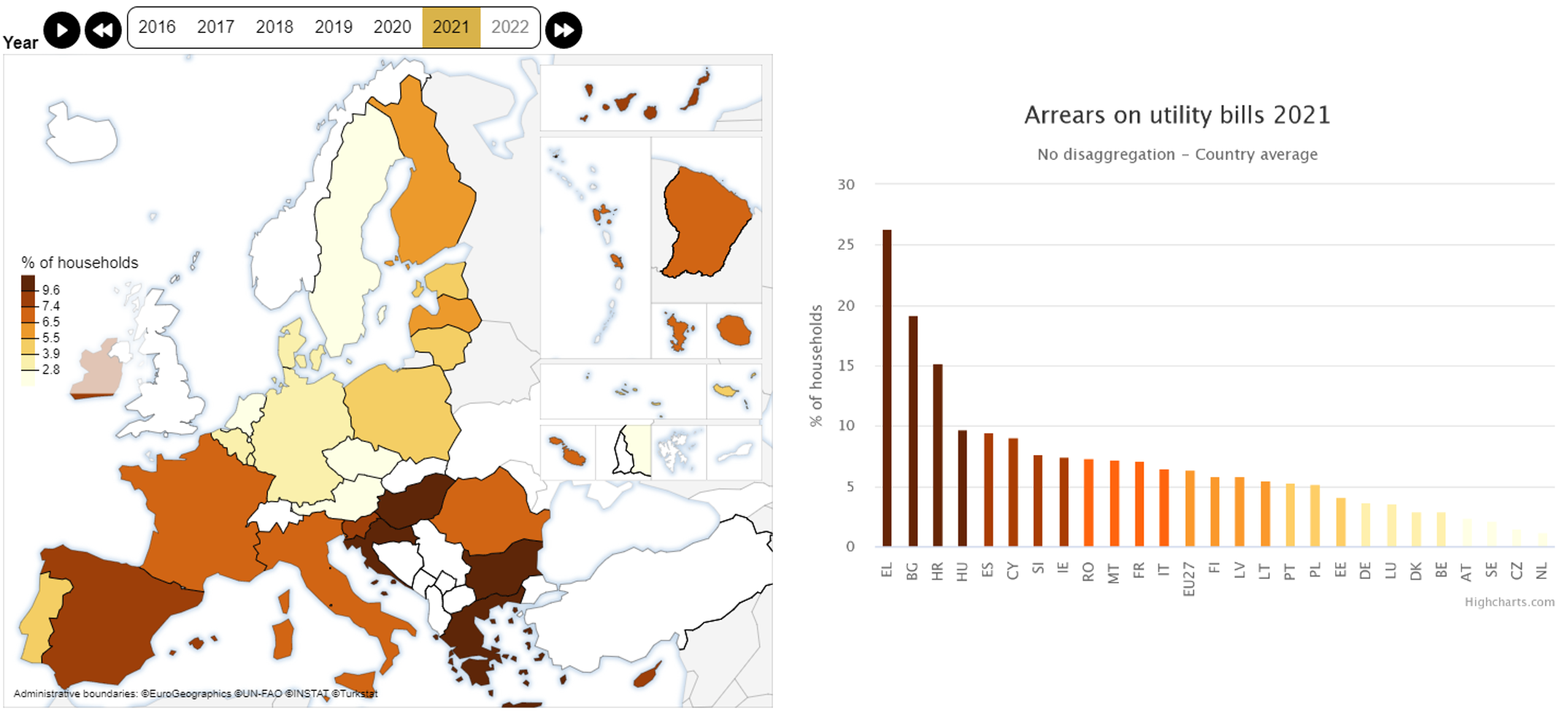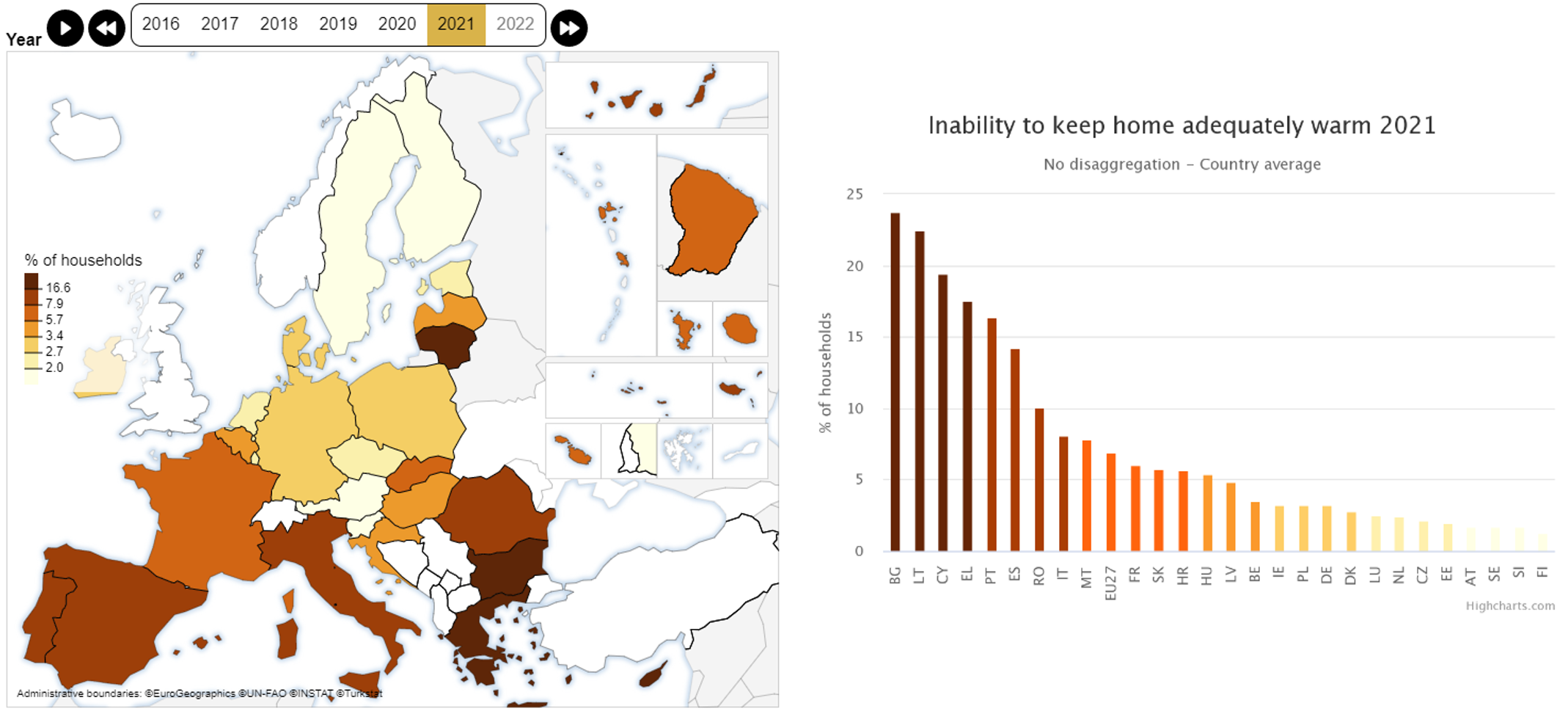By Dr. Eleonora Gaydarova and Dr. Georgi Georgiev – CAC Centre for Sustainable Housing
JUSTEM comes at the right time against a backdrop of turbulence in the just energy transition process in Europe. The project will become a living lab for the implementation of sustainable approaches to empower citizens from the coal regions to actively participate in the ongoing accelerated transformations and strategies for energy poverty alleviation.
The energy poverty challenge
The multifaceted phenomenon energy poverty occurs when households are unable to secure a level and quality of domestic energy services such as space cooling and heating, cooking, appliances, information technology that is sufficient for their social and material needs (Bouzarovski, 2018)[1]. Around 34 million people in the European Union suffer from energy poverty because they are forced to reduce their energy consumption as a result of low income and the unaffordable prices of energy sources, with the subsequent negative impacts on their health and well-being. The situation is further exacerbated by the current condition of their homes which are often energy inefficient featuring outdated and power-hungry household appliances.
JUSTEM focuses on the major coal regions in six EU Member States – Bulgaria, Croatia, Greece, Poland, Romania and Spain. According to EU statistics summarised by the Energy Poverty Advisory Hub, these countries top the negative rankings in the European Union determined on the basis of major consensual-based primary indicators for measuring energy poverty.
Greece, Bulgaria and Croatia are the EU countries with the highest share of people who have arrears in paying their utility bills.

In addition, Bulgaria and Greece are among the EU countries with the highest share of people failing to keep their homes sufficiently heated to meet their needs.

As stated by the Right to Energy Coalition fossil fuels continue to dominate the energy supply and the majority of residential buildings in the European Union are considered energy inefficient. In fact, the high fossil energy intensity of most European economies has been a key factor behind the rising energy poverty across the continent.
Energy poverty and the just energy transition
The need to guarantee justice and inclusiveness by providing fair distribution, full recognition of rights, equal participation in decision-making, reduction or compensation for future detriments necessitates a more holistic understanding of the energy transition. When we talk about energy poverty in the JUSTEM coal regions, the complexity of the energy poverty phenomenon is a result of the intersection and interaction of the three fundamental dimensions – the Built, the Social and the Just. In JUSTEM, local citizens with their needs and concerns have a pivotal role.
The process of coal phase-out is expected to heavily hit JUSTEM coal regions with serious losses of coal sector jobs and thus affecting local labour markets and communities that are the most vulnerable to worsening energy poverty due to loss of income. Therefore, JUSTEM will investigate the potential of the Just Transition Fund and the Renovation Wave in relation to the energy renovation of existing housing as the most promising financial support mechanisms and policy initiatives launched under the European Green Deal to tackle the energy poverty drivers.
There is a complementary dimension to the link between energy poverty and the energy transition processes. JUSTEM coal regions are still largely dependent on fossil fuels for heating of homes, in particular on coal. Heating accounts for the largest share of household energy cost and it is often this expenditure that drives low-income households into energy poverty. JUSTEM faces the challenge of ensuring through the energy poverty alleviation plans that people in energy poverty are able to reduce the energy demand, increase the energy efficiency of their homes and switch to clean heating systems.
Applying local approach to assessing and alleviating energy poverty
We will analyse the energy poverty profile in the different national contexts on the basis of the research of available regional data (or adjusted national datasets) representing the symptoms and drivers of energy poverty in the pilot coal regions. JUSTEM’s approach will strongly rely on EPAH national indicators assessment with relevant adjustments. Exploring Subnational Scale Analysis is the biggest research challenge due to the lack of comprehensive local data. JUSTEM will therefore use a set of local indicators summarised in the Reporting Guidelines on Energy Poverty elaborated by the Covenant of Mayors Europe in collaboration with the European Commission’s Joint Research Centre and the Energy Poverty Advisory Hub.
In JUSTEM we aim to assess the local energy poverty status in order to be able to adjust the actions implemented in the targeted coal regions as part of their TJTPs and to develop concrete projects that support and enable the alleviation of energy poverty. Moreover, we will tailor the methodology to be implemented to each local context and will support the efforts at local level to develop plans with a strong set of measures for energy poverty alleviation as part of a just energy transition of JUSTEM coal regions.
[1] Bouzarovski, S. (2018). Energy Poverty. https://doi.org.10.1007/978-3-319-69299-9_1


